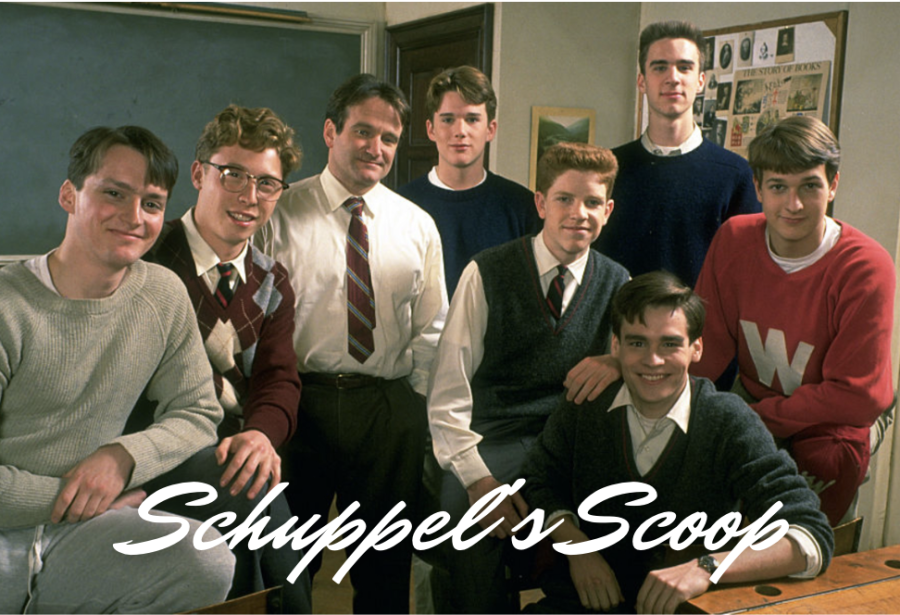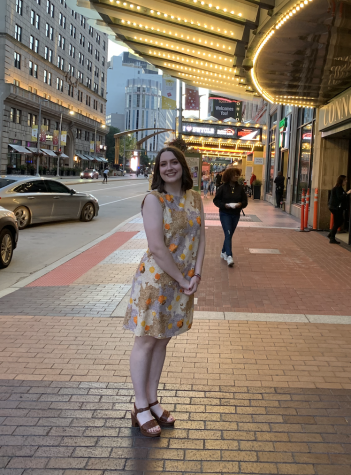Schuppel’s Scoop: what’s the appeal of dark academia?
Claire Schuppel writes about her love for dark academia and what the subgenre entails.
Oct 28, 2022
We are in the peak of the best weather and foliage all year. Surrounded by the beauty of orange and red leaves, I want to dive head first into the glory that is dark academia media. While the term is newer, it is applicable to decades of excellent film and literature.
Though there is not a specific definition of what dark academia is, Adiba Jaigirdar of Book Riot sums it up well stating, “…a focus on the pursuit of knowledge, and an exploration of death and morbidity.” This central idea is often paired with images of New England colleges in the fall; Greta Gerwig’s “Little Women” adaptation is the perfect representation of dark academia’s aesthetic alone.
Before I knew there was a term for this subgenre, I’ve always considered different media that explore the previously mentioned themes to be some of my favorites. As someone who is fortunate enough to pursue a university education, I am fascinated by academic culture and the liberal arts. The literature that resonated with me in school was usually existential in nature as Franz Kafka’s “The Metamorphosis” and J.D. Salinger’s “The Catcher in the Rye” were among my favorites.
To paint a better picture of dark academia, we can look at one of its most famous examples: “Dead Poets Society.” The movie was first introduced to me in (JCU alumna) Mrs. Brady’s advanced English class my sophomore year of high school. I decided to watch it before our class viewing because I had a gut feeling that it would ruin my day – I was right. It’s a poetic and heartbreaking story of a group of students who have an affinity for their English teacher, Mr. John Keating (portrayed by the incomparable Robin Williams). It fits the mold of the dark academia subgenre; the romanticized boarding school experience is paired with the fall aesthetic. The central themes of fraternity and Keating’s emphasis of “carpe diem” align well with other entries in the subgenre.
In terms of literature, there is no book that encapsulates dark academia quite like Donna Tartt’s “The Secret History.” It is a perfect book in my eyes which revolves around a group of incredibly pretentious college students in Vermont who end up with one of their own dead. The first line of the novel is,“The snow in the mountains was melting and Bunny had been dead for several weeks before we came to understand the gravity of our situation.” This is everything that dark academia is: it pairs the cold atmosphere with young people grappling with death’s permanence. We find out a few pages later that they all study classics, the icing on the cake for the epitome of the subgenre.
M. L. Rio’s “If We Were Villains” is another novel that fans of dark academia fawn over. While the entry is not as strong as “The Secret History,” I still managed to finish it in only a day since the subject matter was so similar to its predecessor. Similarly, it is in the same vein of New England college murder mysteries, but centered around a group of theater students. It is just as dramatic as “The Secret History” but is less lengthy – good for some, bad for people like me who need to know everything about the characters.
But this all still begs the question, what do I find so appealing about the subgenre? There must be some part of me that yearns to live in the atmosphere of the previously mentioned stories (minus the deaths), especially because of how much I love academics and the acquisition of knowledge. I also find the themes of comradery in the stories interesting, especially from a psychological perspective. The stories are typically full of indulgence, where friends enable each other to do heinous things to one another. It is a compelling look inside the adolescent/young adult mind.
The time to dive into a book like “The Secret History” is now! Treat yourself to a dramaticized college tale while listening to some Sufjan Stevens and sipping on tea – there is nothing more autumnal than that.













